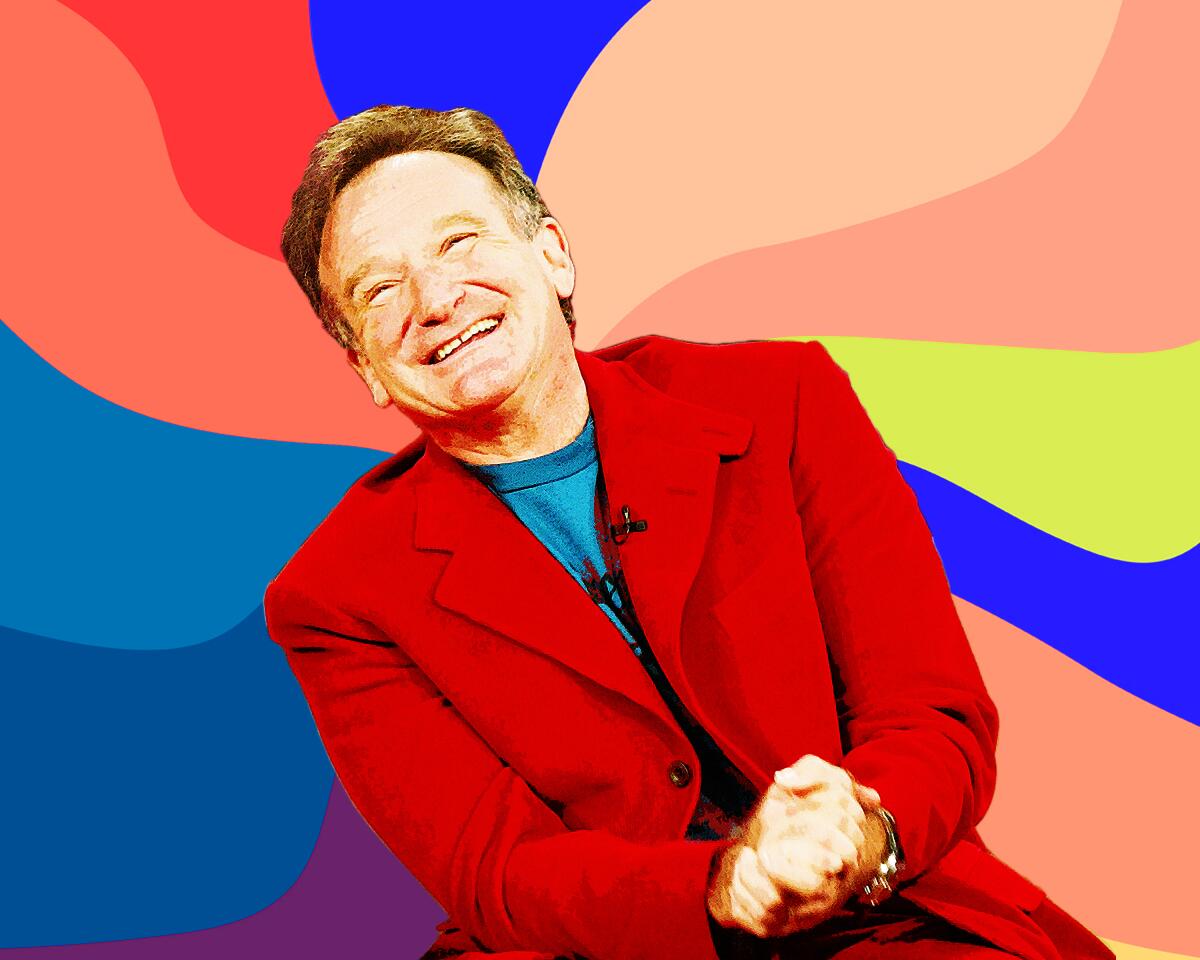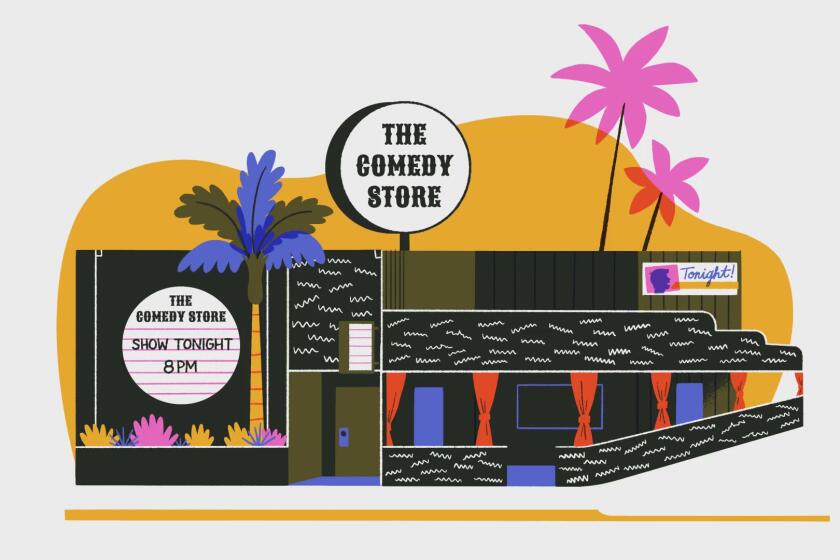Commentary: The best comedy lesson Robin Williams taught me was learning to laugh at myself

I interviewed Robin Williams on the set of his last show, “The Crazy Ones,” seven months before he took his own life in 2014. As an entertainment journalist, I’m rarely nervous meeting celebrities, but I could barely sleep the night before my encounter with Williams. He was — to put it lightly—a hero of mine.
Williams’ 1986 special, “A Night at the Met,” had turned me on to stand-up as a theater-loving kid. I’d watched it at least a dozen times on VHS in high school and could quote large swaths of it verbatim.
As a teenager, I laughed at Williams’ high-octane antics. But when I began watching his stand-up in college — as my own life got more complex, and my experiences darker and more extreme — I started to recognize myself in his anecdotes, and my laughter became more genuine.
Cheer up at one of these spots for stand-up comedy in L.A.
In this way, Williams was the first comedian to teach me the healing power of laughing at myself. I wish I’d told him that during the 25 minutes we were alone in a room together, but I did very little talking that day. I was just happy listening to Williams. I remember him as soft-spoken and kind, almost shy when we were alone. He didn’t relish talking about himself and regularly steered the conversation in praise of his “Crazy Ones” co-star, Sarah Michelle Gellar.
Williams paid to have a Kogi Korean BBQ taco truck outside the soundstage the day I visited the set and seemed most interested in making sure everyone got fed, often stopping to ask his colleagues if they enjoyed the food.
When Williams joined the fray of the cast and crew during shooting, however, he came alive. His on-set humor was frenzied and physical. He’d appear behind two gaffers and do a wild dance until everyone around him howled with laughter. It occurred to me as I sat watching and taking notes that Williams was laughing at himself during these intervals, hamming it up in an exaggerated caricature of what others expected of him.
The gift of crystal-clear self-awareness is the currency — and curse — of any truly good stand-up comedian. The ability to see oneself with 20/20 accuracy — the flaws, the ugly thoughts, the uncomfortable truths, the selfishness, the drunkenness, the bad behavior — provides some of the best comedic material.
The stand-up’s job is one of public self-flagellation in service of the greater good. Audience members laugh — even if they don’t quite realize it, or can’t square themselves with the difficult reality of it — because they can relate to the comedian’s foibles and failures. We laugh because the successful comedian has held a mirror up to our private lives and secret thoughts.
“For me, comedy starts as a spew, a kind of explosion, and then you sculpt it from there, if at all. It comes out of a deeper, darker side. Maybe it comes from anger, because I’m outraged by cruel absurdities, the hypocrisy that exists everywhere, even within yourself, where it’s hardest to see,” Williams once said.
And laughter makes us feel better. It cures us, or at least patches up our wounds temporarily, so we can wake up to fight another day.
Lying on my couch with a crushing hangover in college and watching Williams’ famous bit on alcohol and marijuana (“It’s 5 o’clock in the morning, you’ve just pissed on a dumpster, it’s Miller Time”) pulled me from the unbearable depths of self-loathing more than a few times during my youthful party days.
Laughter at your own expense — unleashed when you need it most — can heal what ails you, keep your ego in check and even speed your path to enlightenment.
Another one of my favorite stand-up comedians, one who is so preternaturally self-aware that it can be painful to watch, is Maria Bamford. Bamford, like Williams, struck a note with me based on my ability to relate with many of the things she talked about in her set.
Her “Anxiety Song,” in particular, was a revelation. It’s a tuneless ditty that breaks down the oddball activities Bamford engages in to keep dark thoughts at bay. (“If I keep the kitchen floor clean, no one will die / As long as I clench my fists at odd intervals, then the darkness in me won’t force me to do anything inappropriate.”)
As a child, I concocted an elaborate dishwashing routine that doubled as a race against the clock. The goal was to finish by a certain minute and second in order to stop something terrible from happening to my family. As I got older, the routines became more baroque: doing the sign of the cross three times quickly and saying the Lord’s Prayer uninterrupted while tracing words on the roof of my mouth with my tongue in order for my plane to land safely, for example.
As an adult deep in the throes of generalized anxiety disorder, I found a form of therapy — before I started therapy myself — in Bamford’s unflinching public dissection of her extreme obsessive compulsive disorder. I couldn’t relate to her fear that she might chop up her family into small pieces, have sex with those pieces, put them on a Cobb salad and feed them to baby Jesus (one of her best, if not most disturbing, bits), but I sure understood her fixations and elaborate routines.
And it felt truly good to laugh at anxiety-driven personal habits that were overwhelming and debilitating. Bamford’s psychic pain, so clearly communicated through her comedy, became a balm for my own. When I laughed at her jokes, I was also laughing at myself. We were in cahoots.
It’s a cliché that comedians tend to be depressed — to have demons, drug addictions and outsized personal problems. Williams certainly checked a number of those boxes, along with about a million others full of generosity, laughter and kindness. The same can be said of Bamford, and many other stand-out, stand-up comedians. Clichés, it is cliché to say, exist for a reason. Because they often hold a grain of truth.
The light can’t exist without the darkness. The more extreme one is, the more extreme the other becomes. Comedians, like all of us, have to fight to find that balance — they’re just better at doing it in front of others in an entertaining way. The ritual of performing, stand-up comics often say, provides a release impossible to find elsewhere.
The world is a place of high drama. It’s hard to not feel lost in the pain and chaos of daily living. A little self-awareness can provide the balance we crave, centering us with needed levity. If self-deprecating laughter is the best medicine, then stand-up comedy is just what the demented doctor ordered.
More to Read
The biggest entertainment stories
Get our big stories about Hollywood, film, television, music, arts, culture and more right in your inbox as soon as they publish.
You may occasionally receive promotional content from the Los Angeles Times.












